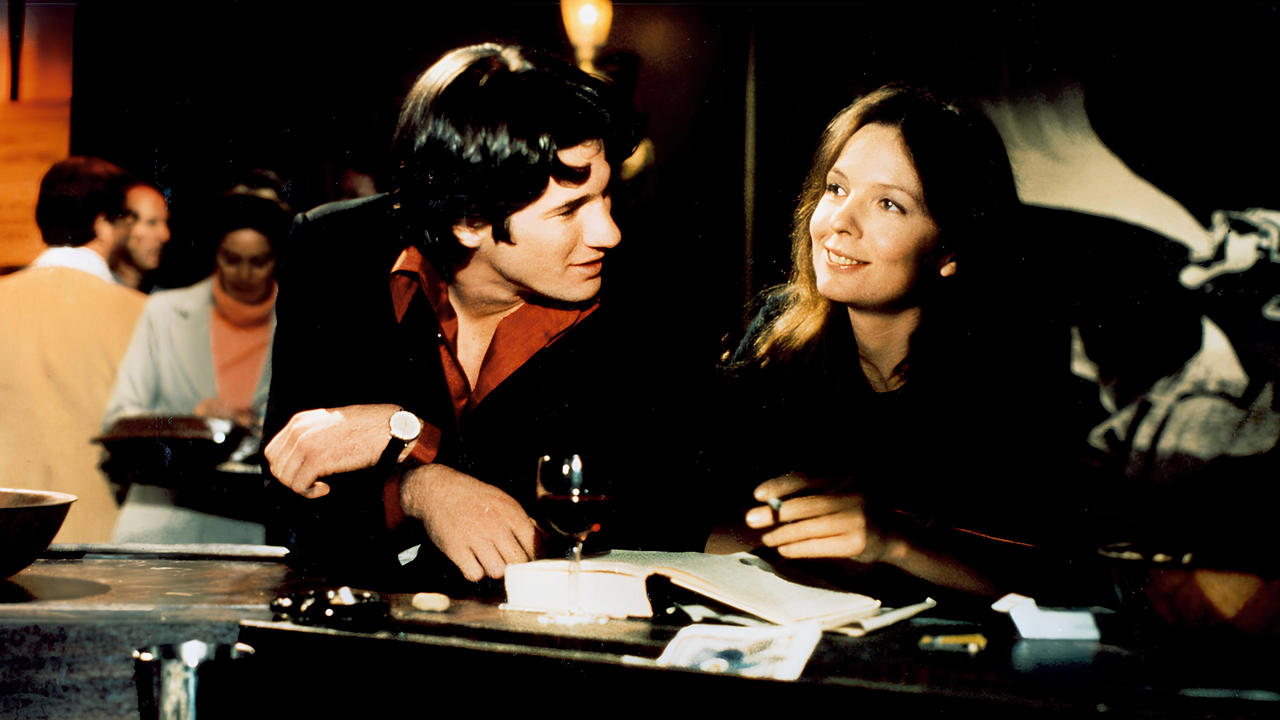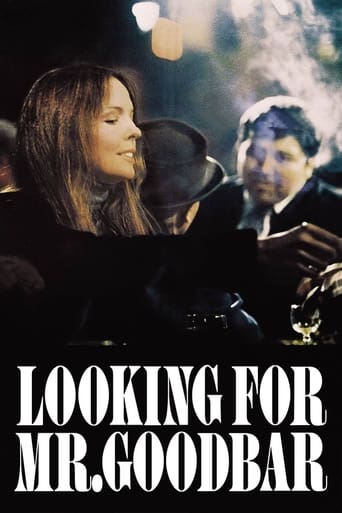Perry Kate
Very very predictable, including the post credit scene !!!
Sexylocher
Masterful Movie
Beystiman
It's fun, it's light, [but] it has a hard time when its tries to get heavy.
Rio Hayward
All of these films share one commonality, that being a kind of emotional center that humanizes a cast of monsters.
jmillerdp
Odd, very scattered movie about a woman who goes down a road to ruin through random hook-ups, drugs, and encounters with violent men.Screenwriter/Director Richard Brooks has done very good work before ("In Cold Blood"). But, here, the narrative is all over the place. The film begins with Diane Keaton's character having waking fantasies, but they are awkwardly edited in. Brooks then has real problems in constructing the story throughout.There was a novel, and I have no idea if it had the same problems or not. Regardless, Brooks should have thought this out a lot better.Diane Keaton is fine in the lead. The acting otherwise ranges from seriously overcooked to passive-aggressive. The result of the writing and overacting leads to melodrama, where the movie could have told a much more interesting story.For instance, the guy playing Keaton's father is this borderline-psychotic Catholic character who is endlessly screaming and yelling at his daughters when they don't toe the line according to his hard-right religious ideals.A very odd disappointment that could, and should, have been a lot better.Plus, you can see what's going to happen by film's end coming a billion miles away!**** (4 Out of 10 Stars)
NORDIC-2
On Jan. 2, 1973 a 28-year-old schoolteacher named Roseann Quinn was stabbed to death in her New York City apartment by John Wayne Wilson, a drifter from Indiana she picked up in a bar across the street from her home on W. 72nd Street. Roseann Quinn's brutal murder revealed that she had lived a double life—as a respected, skilled and devoted teacher of deaf-mutes by day and a habitué of Westside bars at night, where she picked up random men for rough sex on a regular basis. Ms. Quinn's strange and lurid story generated reams of titillating newspaper fodder. It also prompted novelist Judith Rossner to write a best selling quasi-fictionalized version of her life and death: 'Looking for Mr. Goodbar' (Simon & Schuster, 1975). Writer-director Richard Brooks ('Lord Jim'; 'In Cold Blood') brings Rossner's book to the screen with somewhat ambiguous results. Diane Keaton's performance as Teresa Dunn (the Roseann Quinn figure) is mesmerizing—far and away, the best of her career—but Richard Brooks' screenplay turns Dunn/Quinn into a daring sexual rebel, druggie, and reckless hedonist when the evidence suggests that the real Roseann Quinn was a desperately lonely and decidedly masochistic personality who sought out abusive sexual encounters in keeping with her own low self-esteem (which stemmed from a repressive Irish Catholic upbringing and a congenital back deformation that left her ashamed of her body). By turning Roseann Quinn into the far more beautiful and charismatic Teresa Dunn, Brooks turns her death into a voyeuristic thriller for male viewers and a cautionary tale for sexually liberated women everywhere: they had better be careful flaunting their sexual assets or they might end up the victims of homicidal male rage. Despite these distortions, 'Looking for Mr. Goodbar' remains an eerily sinister and deeply disturbing film. Rivaling Diane Keaton's performance is that of Tuesday Weld, who plays Teresa's sybaritic but world-weary older sister, Katherine. Indeed Weld was so good she was nominated for a Best Supporting Oscar. 'Looking for Mr. Goodbar' also marks the film debut of Richard Gere as Tony Lo Porto, the John Wayne Wilson figure.
christopher-underwood
It was searching for a copy of this that led me to a source of otherwise unavailable films but the lengthy running time has put me off watching it, for some time. Also, I cannot now remember what got me intrigued by the title anyway. In any event the thing is now watched. It seems to me there is a bit too much of everything here, certainly Richard Gere and Tuesday Weld who are well over the top. Keaton is fine but her character begins to irritate halfway through, what with all her neediness and simultaneously thrusting of people aside, her wonderfully virtuous deaf classes, adding nothing whatsoever and the growing tedium of the shadowy scenes of sex and drugs. Brave of Keaton to take the role but if only Brooks could have kept it to something more like 90 minutes we would surely have had a much more succinct and effective movie. Too many characters to little effect and too many downers and not enough uppers.
frncsbrennan
I watched this film again recently to see if it would give me the same impression it gave me as a teenager. I saw this movie with a group of friends when it first came out. We didn't know what to expect, but when we all came out of the theater I noticed everyone looked a bit dazed. I felt kind of numb. The ending still packs a big punch, still one of harshest and abrupt I've ever seen. I have a tendency to like happy endings, but this is still a good, well-acted movie. Keaton is great in this, and she draws you in to caring about the character, Theresa Dunn. She is a shy, caring person who teaches deaf children; unfortunately, she also has a sex addiction. Weld (Katherine) gives her best performance as the older sister who leans on and looks up to her younger sister, as her "rock of Gibraltar." In the end, the sisters reverse roles, and it is Theresa who needs help. I feel the message of this movie is to not confuse women's liberation (or any liberation) with promiscuity and addiction, which is actual slavery. The supporting cast is excellent, with both Richard Gere and Tom Berenger giving gritty performances early on in their careers.

